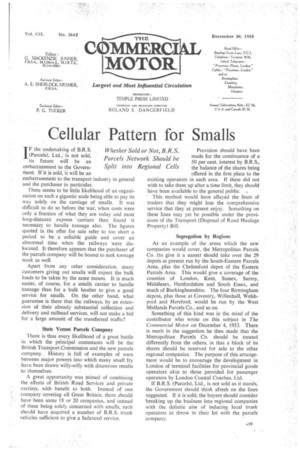Cellular Pattern for Smalls
Page 21

If you've noticed an error in this article please click here to report it so we can fix it.
IF the undertaking of B.R.S. (Parcels), Ltd.: is not sold, its future will be an embarrassment to the Government. If it is sold, it will be an embarrassment to the transport industry in general and the purchaser in particular.
There seems to be little likelihood of an organization on such a gigantic scale being able to pay its way solely, on the carriage of smalls. It was difficult to do so before the war, when costs were only a fraction of what they are today and most long-distance express 'carriers then found it necessary to handle tonnage also. The figures quoted in the offer for sale refer to too short a period to be a 'reliable guide and cover an abnormal time when the railways were dislocated. It therefore appears that the purchaser of the parcels company will be bound to seek tonnage work as well.
Apart from any other consideration, many customers giving out smalls will expect the bulk loads to be taken by the same means. It is much easier, of course, for a smalls carrier to handle tonnage than for a bulk haulier to give a good service for smalls. On the other hand, what guarantee is there that the railways, by an extension of their already substantial collection and delivery and railhead'services, will not make a bid for a large amount of the transferred traffic?
State Versus Parcels Company There is thus every likelihood of a great battle in which the principal contestants will be the British Transport Commission and the new parcels company. History is full of examples of wars between major powers into which many small fry have been drawn willy-nilly with disastrous results to themselves.
A great opportunity was missed of combining the efforts of British Road Services and private carriers, with benefit to both. Instead of one company covering all Great Britain, there should have been some 18 or 20 companies, and instead of these being solely concerned with smalls, each should have acquired a number of B.R.S. trunk vehicles sufficient to give a balanced service. Provision should have been made for the continuance of a 50 per cent. interest by B.R.S., the balance of the shares being offered in the first place to the existing operators in each area. If these did not wish to take them up after a time limit, they should have been available to the general public.
-This method would have allayed the fears of traders that they might lose the comprehensive service that they at present enjoy. Something on these lines may yet be possible under the provisions of the Transport (Disposal of Road Haulage Property) Bill.
Segregation by Regions As an example of the areas which the new companies would cover, the Metropolitan Parcels Co. (to give it a name) should take over the 29 depots at present run by the South-Eastern Parcels Area, plus the Chelmsford depot of the Eastern Parcels Area. This would give a coverage of the counties of London, Kent, Sussex, Surrey, Middlesex, Hertfordshire and South Essex, and much of Buckinghamshire_ The four Birmingham depots, plus those at Coventry, ,Willenhall, Welshpool and Hereford, would be run by the West Midlands Parcels Co., and so on.
Something of this kind was in the mind of the contributor who wrote on this subject in The Commercial Motor on December 4, 1953. There is merit in the suggestion he then made that the Metropolitan Parcels • CO. should be treated differently from the others, in that a block of its shares should be reserved for sale to the other regional companies. The purpose of this-arrangement would be to encourage the development in London of terminal facilities for provincial goods operators akin to those provided for passenger operators by London Coastal Coaches, Ltd.
-If B.R.S. (Parcels), Ltd., is not sold as it stands, the Government should think afresh on the lines suggested. If it is sold, the buyers should consider breaking up the business into regional companies with the definite aim of inducing local trunk operators to throw in their lot with the parcels company.




















































































